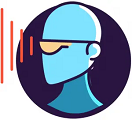Type of project: European | Start date: 06/10/2020 | End date: 05/10/2024
“Within the next 10 years, many millions of people will be … wearing relatively unobtrusive … devices that offer an immersive and high-resolution view of a visually augmented world.” (Ken Perlin, 2016)
This is the human-machine era, a time when our senses are not just supplemented by handheld mobile devices, but thoroughly augmented as well. The language we see, hear and produce will be mediated in real time by technology. This has major implications for the language use and, ultimately, for the language itself. Are linguists ready for this? Can our theory, methods and epistemology handle it?
LITHME is a COST Action network with members from all EU Member States and a number of non-EU countries. Researchers from 39 countries have joined their forces to forecast how the emerging technologies are likely to change our everyday language use and, ultimately, language itself.
LITHME has two aims: (i) to prepare Linguistics and its subdisciplines for what is coming; (ii) to facilitate a longer term dialogue between linguists and technology developers.
How will pervasive augmentation technology affect language in areas such as international law, translation and other forms of language work? What will this mean for how people identify with specific languages? Could increasing reliance on real-time language technologies actually change the structure of language? Longer term, could developments in brain-machine interfaces serve to complement or even supersede the language altogether? Linguistics will be far stronger for robust technological foresight, while developers will benefit from a better understanding of the potential linguistic and societal consequences of their creations.
LITHME will shine a light on the ethical implications of emerging language technologies. Inequality of access to technologies, questions of privacy and security, new vectors for deception and crime: these and other critical issues will be kept to the fore. LITHME will prepare linguists and stakeholders to face the human-machine era.


Acronym:
LITHME
Funding programme:
Horizon 2020
Funding body:
European Union - European Cooperation in Science and Technology
Grant agreement:
Proposal Reference OC-2019-1-23689 - MoU No. COST 005/20 - Action No. CA19102
Status:
Ended
CNR-ILC role:
Beneficiary
Website/s:
https://lithme.eu
https://www.cost.eu/actions/CA19102
https://www.facebook.com/LgHumanMachine
https://twitter.com/LgHumanMachine

